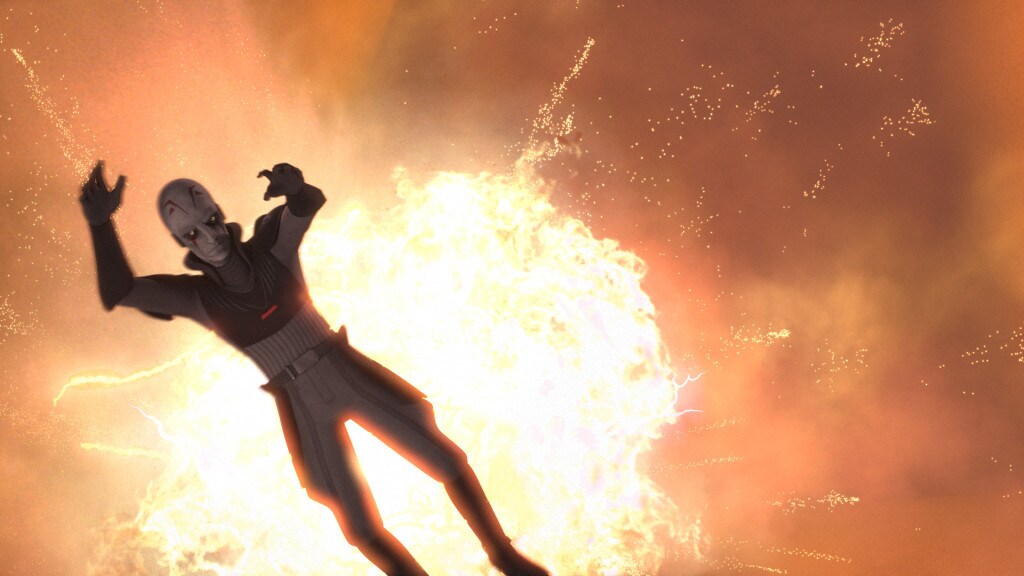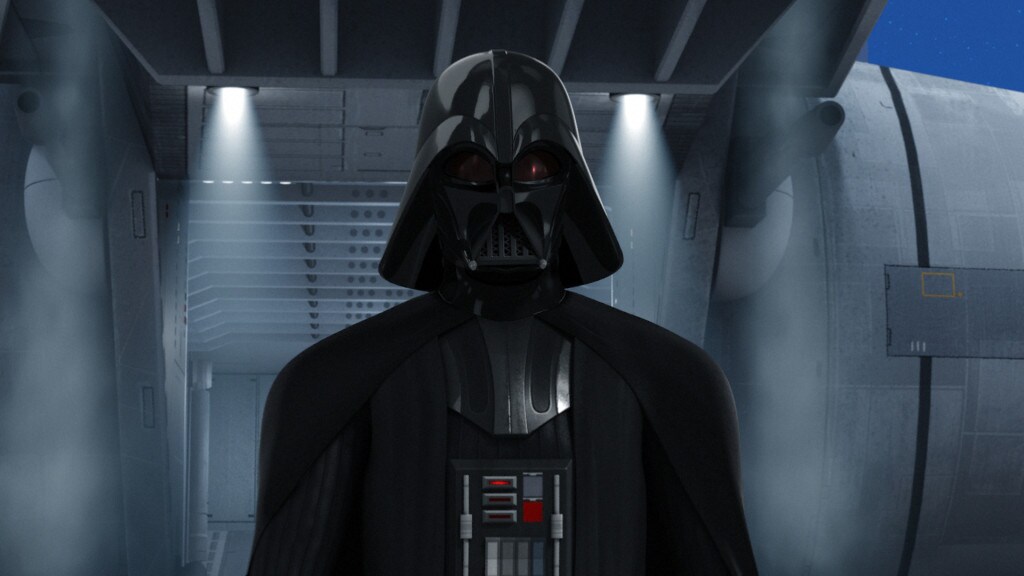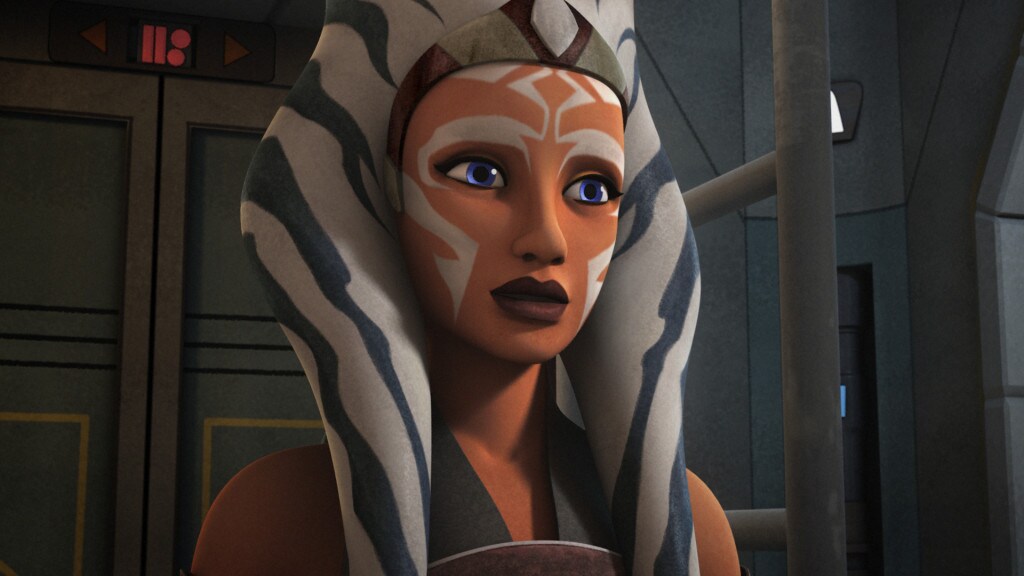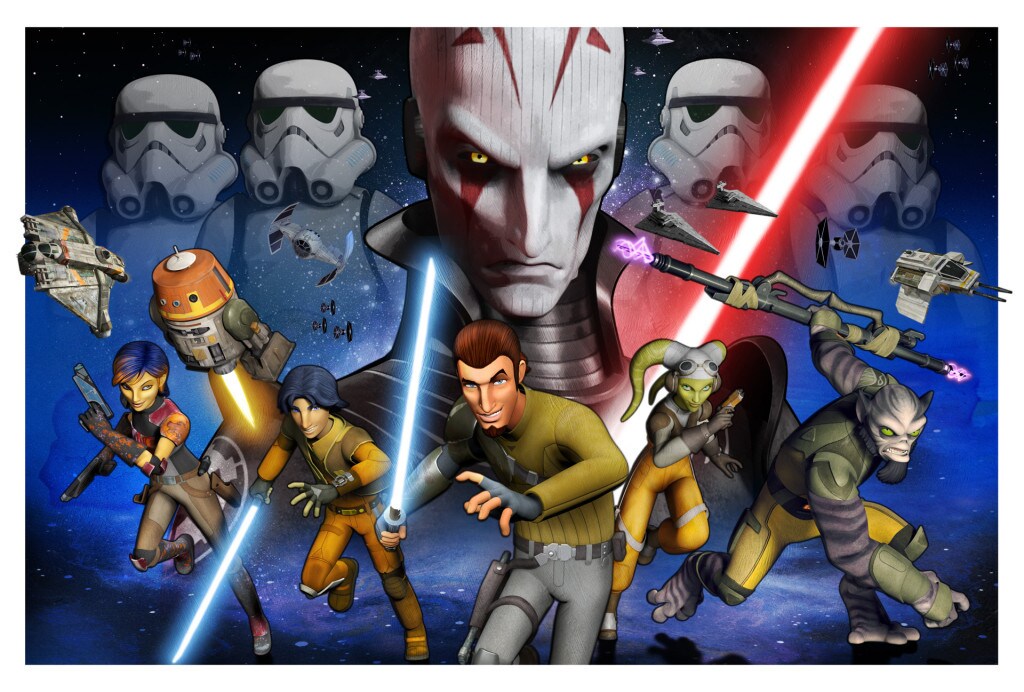The Inquisitor. Vader. Ahsoka. The Star Wars Rebels executive producer discusses the show's first-season finale and more!
StarWars.com concludes its deep dive into Season One of Star Wars Rebels with executive producer Dave Filoni, discussing the biggest moments of the thrill-a-minute season finale -- including the return of a certain Sith Lord and his former Padawan -- and what it all means for the Ghost crew. (Consider this your official spoiler warning and, in case you missed them, be sure to read part one and part two of this interview!)
StarWars.com: On to the season finale. There was something about the Inquisitor's death -- and maybe you disagree -- that seemed Jedi-like to me. He didn't seem afraid to die; he accepted his death. Can you talk about that?
Dave Filoni: It's interesting. The Inquisitor chose death because it was easier than facing the penalty for his failure. He's afraid of Vader and knows he would probably die at his hand. That’s why he tells Kanan, "There are far worse things than death." He gives in to death, but he doesn't do it like Obi-Wan, surrendering in a poetic way, sacrificing himself for the greater good. The Inquisitor does it out of fear.
In the original version of the script, Kanan reaches out to save the Inquisitor, but the more I thought about it, I just didn’t believe it. I don't think there's anything that the Inquisitor does up to that point to make that a smart decision for Kanan.
StarWars.com: Or to show that he's redeemable.
Dave Filoni: Right. If Kanan reaches out, the Inquisitor would take his hand, Kanan would pull him up, and the Inquisitor would choke him to death. He would still attack Kanan. This isn't that "I'm redeeming you" moment. I think there is something within Kanan that's telling him that, on the higher path, that is what he should do, but he's not there yet.
StarWars.com: Had the Inquisitor jumped back up, Kanan would have killed him, right?
Dave Filoni: That's a hard question. Did killing Darth Maul really help Obi-Wan? Or was Obi-Wan avenging Qui-Gon's death? We find out later that Maul wasn't dead. The vengeful feeling in Maul lasted for years and lead to the deaths of many, including somebody Obi-Wan really cared about.
Think of it this way. He kills Maul, theoretically, in The Phantom Menace. The Jedi don't learn whether he was an apprentice or a Master. They don't learn anything about the Sith. They learn nothing, and Palpatine's plans continue. But if he captures Maul, which would've been harder, maybe [Palpatine's scheme] doesn't go as planned. Same thing with Mace Windu. He goes into the Chancellor's office to arrest him. That's the right idea. He resolves, after the Chancellor murders the other Jedi, to kill him. "He's too dangerous to be left alive." Mace knows the courts will let him off, right? Well, his decision to kill Palpatine is what drives Anakin to save Palpatine. I believe if Mace tries to persist with arresting him, Anakin will go along with it, so there's a fair trial. So, these little gray areas and decisions end up having a big impact. The Inquisitor and his effect on Kanan is probably not over.
StarWars.com: I feel like a huge theme this season, from beginning to end, was fear. Was that a conscious decision from the outset?
Dave Filoni: Our stories are dealing with a young kid who is growing up in a world that's under tyranny. You don't have to be choosing the light side of the Force or the dark side of the Force to be affected by fear. Fear informs, unfortunately, too many decisions for people every day. Part of the challenge in life is to identify when you're doing the right thing or acting out of fear. That's something I think the Jedi struggle with. You never hit a point where you're past it. You can hit different levels of enlightenment, for sure, but there's always the threat that corruption will occur. That you'll become afraid. That fear will turn to anger and you'll be jealous or greedy about things. You always have to check and balance all these things all the time.
StarWars.com: Why is Tarkin so scary?
Dave Filoni: Because Tarkin's in charge. Outside of the Emperor, you'd be hard pressed to find somebody with more authority, especially militarily, than Tarkin. Tarkin outranks Vader. Vader has to listen to Tarkin. So, to a generation of kids that didn't grow up with Star Wars, that's new to Star Wars, how do you relate to them that this old man is in charge when the Inquisitor's so cool and has so much power? Well, Tarkin comes in and is unimpressed with all of them, and puts them in their place. He doesn't suffer fools. He doesn't even believe that Kanan is a Jedi. All of these things help make him a powerful figure.
Tarkin didn't initially arrive on a shuttle. He just walked into a room. The Aresko and Grint execution wasn't in the original script. That was something that I added later. We needed to introduce Tarkin to a new audience and, I think, not only did we present him to a new audience effectively, we lived up to the reputation that Tarkin had with the older fans. The adult fans believe he's this evil man, so we have to live up to that reputation.
A big part that can't be overlooked with Tarkin is [voice actor] Stephen Stanton. Stephen did an amazing thing that he doesn't get enough credit for: He made Tarkin younger in Clone Wars. So, he couldn't just parrot what he heard in the old movies. He had to create a younger sounding voice, which he did really well. Then, we were able to take the dialogue and cater it to this older version of the character. It's a marriage of the A New Hope Tarkin and the Clone Wars Tarkin. Now we have this Rebels Tarkin, who is probably the most evil character we've had on the show. And he should be.
Here was a villain that looked down on the other villains on the show. He's like, "You guys are goofing off too much. I won't stand for that." Then you see him execute Aresko and Grint, and that really draws a line.
StarWars.com: He's killing lesser evil people, which takes him to another level of villainy.
Dave Filoni: There’s much more evil in Tarkin. When Tarkin fails by the end of the season -- not really through his own fault -- he brings in the real heavy: Darth Vader. That’s very troubling for Season Two.
It’s important to note that we’re not telling Darth Vader's story. What Vader represents to me in Rebels is the ultimate manifestation of your fear, and of your inability to move forward. They are not going to be able to defeat Darth Vader. This is an immovable object. The easiest way to explain it is, our heroes are like level five characters and Vader’s level 50. [Laughs] It's not going to take much for him to do them in.
StarWars.com: Does the Ghost crew know that Darth Vader exists? Have they heard of him?
Dave Filoni: That's another thing you battle all the time. There's a popular thought among fans that people all know who this guy is. Why would they? I don't think people on Coruscant really care or know that Palpatine is a Sith Lord. A lot of them wouldn't really know what that means. Many of them would say, "Well, the trains are running on time." Everyone's doing well. That's in his favor.
Vader is a known person to some, but to very few, I think. He's known of in whispers. The Imperials know about him, but a lot of them haven't met him. He's not military. He's more the fanatical wing of the Empire. One reason I believe he’s not well known is the fact that if you encounter him, you usually don't survive.
StarWars.com: When I was watching Vader in the last episode, I thought about how you really see a different version of him in each Star Wars movie. Do you have an idea of where Vader is at mentally during Rebels?
Dave Filoni: Oh, yeah. You have to. I've always believed that Vader has no repentant bone in his body until he realizes his son is alive. Luke is the opportunity that triggers everything that occurs. His awareness of Luke being alive forces him to remember his past in a way that's uncomfortable for him. It forces him to remember Padmé. It forces him down a path of, "Maybe my son will join me, and together we can rule the galaxy." Luke really has to get him past that thought, which kind of culminates in that scene on the bridge on Endor, when Vader says, "It's too late for me." That realization only happens because of Luke.
Up until that point, I think he's a destroyer. He's an incredibly angry, hate-filled destroyer. He hates himself. He hates what happened. He hates all his former friends because he thinks they betrayed him. Anakin Skywalker thinks that he never switched sides. He thinks he's still fighting the good fight. He thinks Obi-Wan betrayed him. He thinks Padmé betrayed him and that led to her, and their child's, death. He thinks the Jedi were staging a coup against the Republic. He thinks the Republic was weak, and that's why it became corrupt and fell apart despite Palpatine’s attempts to save it. Overall, he internally hates himself for everything that occurred because he thinks that he wasn't strong enough to make things right.
He’s consumed by these ideas and is pretty much trapped. He has no option aside from embracing his new persona -- Darth Vader. What we encounter in Rebels now is just a wall of anger and hate -- everything that the dark side manifests.
It’s interesting to look at how he might relate to Ahsoka now. She is a living memory of who he was. Even worse, she knew the good person he was.
StarWars.com: He doesn't want a memory of that.
Dave Filoni: He doesn't want to be reminded of this and, in a lot of ways, he probably thinks that whole relationship was a failure because she walked away.
StarWars.com: Do you think he's, in a twisted way, angry at her now?
Dave Filoni: Yeah. I think in the way you indirectly get angry at people when you don't agree with their decisions, or when you let someone walk away and later something bad happens. You think, "Where were you?" You would blame anyone but yourself.
StarWars.com: So, he would have no feeling upon seeing her of, "Oh, great, you're alive."
Dave Filoni: No, I don't think he would think it's great at all.
StarWars.com: He obviously cared for her very much.
Dave Filoni: Of course, but now she and Obi-Wan Kenobi are Public Enemy Number One and Two for him. It's personal. It begs the question: What do they know about each other? What do they know about what happened?
StarWars.com: What about the reveal of Ahsoka? How did you approach that scene?
Dave Filoni: Ahsoka returning to the Star Wars universe was something that I really, of course, wanted to do. I wanted people to get a good look at who she is now. [Composer] Kevin Kiner and I wanted her theme to become apparent as she's talking to Ezra, so it connects you fully to the character in Clone Wars.
It was a developing moment for me, to see this character transition from one style to another. A character that we created in animation to move to another animated look was new ground. When Ashley [Eckstein] does the voice, it all starts to come more alive. It was especially meaningful for the crew that stayed on from The Clone Wars. To see Ahsoka walking around again and to know that we're going to continue the story of this character was a big deal for all of us.
I know how I want to shoot when I go into a scene like that. I really wanted that head-turning moment, when she says, "My name is Ahsoka." It was a fun moment, just having her on the screen again.
StarWars.com: With Clone Wars ending the way it did, and Rebels moving to a new time period, did that give you any new opportunities or paths for Ahsoka that you're now glad to have?
Dave Filoni: It didn't, really. I've always had a long game plan for Ahsoka, personally having been really involved with creating her with George [Lucas]. I’ve gone through different iterations over the years where she didn't survive the Clone Wars, and then I had character paths where she did. I’m constantly developing this character. I know where she is now. I know what her failings are and what will come to haunt her this year, which I think makes her really interesting.
The original plan for her four-part arc in The Clone Wars Season Five was to bring her back to the Jedi Order at the end. I said to George, "Well, that would be what we normally do. What if we keep her expelled and see where it goes?" Luckily, he agreed.
I think the big question is, where does she go from here?
StarWars.com: Will we ever see what happened with her between Clone Wars and Rebels?
Dave Filoni: Maybe. I know what happens up to the end of Clone Wars, and I have ideas about what happens after that. If we have a good enough story, we'll tell it. I think there is a good story about how she becomes Fulcrum.
StarWars.com: Is there anything you want to say about Season Two?
Dave Filoni: It's better. The stakes are higher and the action's better. We've been able to get the story into some very good, exciting, fun places while still maintaining a bit of intensity. If Season One represents A New Hope, Season Two is very much inspired by Empire Strikes Back.
StarWars.com: I have a personal request.
Dave Filoni: [Laughs] Uh huh.
StarWars.com: Is there any chance we can see the Zillo Beast come back in Rebels?
Dave Filoni: No. His scale is too challenging for this production. Also, I don't know what would stop him at this point. The Empire would have to do it. That's ironic, but if I went down and told production I wanted to do the Zillo Beast, they would be so displeased. [Laughs] It was very hard to do.
StarWars.com: How about Mecha Zillo Beast?
Dave Filoni: [Laughs] No. Same difference. The mechanization doesn't help us at all. We could do a baby Zillo Beast.
StarWars.com: I wanted to tell you a short story and get your reaction to it. My nephew is six, and Star Wars never quite took with him. But my brother-in-law found him watching Rebels, and asked him if he liked it. My nephew said, "Yeah. It's a lot better than those movies."
Dave Filoni: Really?
StarWars.com: Yeah. My point is, Rebels is obviously a point of entry for a lot of kids, whether they knew of the movies and liked them or not. What does that mean to you?
Dave Filoni: Well, it's a big responsibility, I'll say that. I've been aware of that for years. George and I really saw that with Clone Wars. I think each generation deserves their own entry point into the story. The prequel generation has theirs, the Clone Wars generation has theirs, and the same will happen soon with The Force Awakens generation. It’s an exciting time for Star Wars -- there’s a time, a place, and a character for everyone.
Dan Brooks is Lucasfilm’s senior content writer, and spends his days writing stuff for and around StarWars.com. He loves Star Wars, ELO, and the New York Rangers, Jets, and Yankees. Follow him on Twitter @dan_brooks where he rants about all these things.





